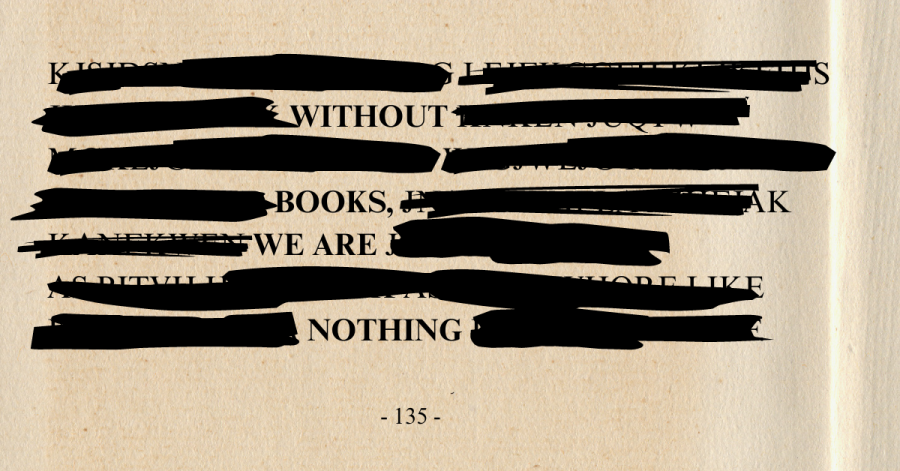The start of a war of words
Censorship in schools has been rising at alarming rates, with books of all genres being taken away from classrooms
PEN America recorded 1,477 instances of individual books being banned, an increase of 28% compared to the six prior months. In recent events, Florida and Texas remain the top two states with the most banned books between July 2021 and June 2022.
Censorship has been a constant problem for centuries and still manages to exist in the modern day, suppressing media such as books, films, news and more. As of 2021, school districts have challenged books in 37 states, led by Florida and Texas. There has been a growing trend of intolerance to literature and it is about time we ask ourselves where to draw the line. In 2023, we are experiencing another war: the war of words.
It is a dystopian concept to see books being taken away from all ages, including kids as young as elementary schoolers. It shows that not only are people scared of what lessons the books might teach, but it also shows how far people will go to keep a certain narrative. Censorship is an insidious threat to our democracy and it is essential that people address this problem.
What some people refer to as the ‘War of Words’ is the series of book bans that date back to 1637. It was a book called “New English Cannon” written by Thomas Morton and is about the biblical account of the Hebrews taking the land of Canaan from the indigenous people and substituting them and their culture with their own. “New English Cannon” was banned because it was considered a harsh and dissenting critique of Puritan customs and power structures. Now in the modern day, books are being banned because of the same reasons.
Earlier this year, you might have seen headlines regarding the series of book restrictions in the state of Florida. A school in Duval County, Florida, has been told to remove all books from the shelves of classrooms or to cover them up until a media specialist reviews all 37,000 of them. So far, 176 books removed were removed in Duval County, leaving shelves and classrooms empty.
New legislation such as HB 1557, or the “Parental Rights in Education,” is a bill that some refer to as the “Don’t Say Gay” bill. The purpose of the law is pretty straightforward: parents are allowed a say what their child’s education consists of and restricts classroom discussion about sexual orientation or gender identity in certain grade levels.
The problem with this law is that it is stretching the truth. People like the Governor of Florida, Ron DeSantis, state that the bill is to prohibit the spread of pornography and sexual instruction in books. However, this is not the case. The bill has targeted books that deal with gender identity, which is a separate concept. Nowhere in HB 1557 does it say that a teacher is not allowed to read about anything remotely graphic such as violence, race and extreme language.
One trend of books being banned has themes of race and racism, LGBTQ+ topics, profanity and slavery in the United States. One major reason for the recent book bans is due to a group that started in 2021 called ‘Moms for Liberty.’ The organization claims to protect parents’ rights in their children’s education; however, there seems to be more to the story. Moms for Liberty claims to stand against government overreach and intimidation tactics. Despite these claims, the organization has attempted to ban books about Martin Luther King Jr and Ruby Bridges. These books teach readers important, first-hand stories, and it is necessary to pass on these stories to inform generations about topics such as racism and discrimination from that time period. At some point, we have to ask ourselves what is necessary to censor, and what is not.
We see these books that are being challenged due to racism, sexism and topics such as gender and sexual orientation. At some point, there must be a line that we can draw when it comes to restricting books. If a book like “Ruby Bridges Goes to School: My True Story” by Ruby Bridges can be banned because of anti-race themes–even though the book is about the racism she experienced when coming to an all-white school–then what are we really teaching? It is simply not okay to ban books like these just because of the fact that they might enlist in certain themes that not everyone might like. Books are meant to bring up important conversations, even if they are uncomfortable to talk about.
The Tennesse school board voted to remove the graphic novel “Maus” from its curriculum. “Maus” is an award-winning graphic novel by Art Spiegelman that tells the story of his Jewish parents living in Poland in the 1940s. It includes interviews with Spiegelman’s father about his background as a Holocaust survivor. The reason behind the book being removed was due to nudity.
When we take away these novels from kids, even if it is for reasons such as nudity and profanity, we are taking away valuable lessons. Authors write stories such as “Maus” to tell an important story that students might not be getting from their teachers. Book banning in the United States is getting out of hand, and it is crucial that we look at what effect censorship is having on students, teachers, education and our democracy overall.









Emily Dudash • May 24, 2023 at 11:36 am
SUCH a great story Katie! Awesome job! ?
Maya Schindler • May 22, 2023 at 10:18 am
This is AMAZING!!!